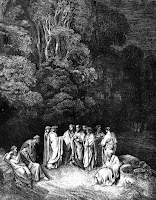 |
| The last bastion of Light and Reson |
In Canto IV, Dante wakes to behold a valley so deep and so dark that nothing above or below can be seen. In the representative "tit-for-tat" fashion by which Hell punishes according to one's sin, this darkness stands for the absence of God's love and light to those who were not fortunate enough to have been baptized. This of course necessitates that all non-Christians and pagans who existed before the time of Christ, regardless of their own merits or virtues, are doomed to this valley of nothingness; forever yearning for God's approval.
That they sinned not; and if they merit had,
'Tis not enough, because they had not baptism
Which is the portal of the Faith thou holdest;
I posted an article recently that had a lot to do with this distinction. Granted, Dante wrote in a time of comparatively hard-line Catholicism, so the idea that faith is not enough, that one must also partake in prescribed ceremony in order to be eligible for salvation is not out of place in this context. This of course is regardless of one's virtues as evidenced by the characters present in the shining palace - the place Dante describes as home to many of who he saw as ancient Rome and Greece's foremost philosophers, leaders, and poets:
Now, I don't know most of these people and you probably don't either. My wife (an English teacher with a taste for the classics) informs me that many of them were from ancient Greece and Rome, and their names would have been widely recognized in Dante's time. I do know that all of them lived before Christ was born and thus they're doomed to chill out in this palace with a bunch of other pagans and otherwise good people who just had the misfortune of not being born into the right culture at the right time. Oh well.People were there with solemn eyes and slow,
Of great authority in their countenance;
They spake but seldom, and with gentle voices.
Thus we withdrew ourselves upon one side
Into an opening luminous and lofty,
So that they all of them were visible.
There opposite, upon the green enamel,
Virtuous Pagans, by Doré
Were pointed out to me the mighty spirits,
Whom to have seen I feel myself exalted.
I saw Electra with companions many,
'Mongst whom I knew both Hector and Aeneas,
Caesar in armour with gerfalcon eyes;
I saw Camilla and Penthesilea
On the other side, and saw the King Latinus,
Who with Lavinia his daughter sat;
I saw that Brutus who drove Tarquin forth,
Lucretia, Julia, Marcia, and Cornelia,
And saw alone, apart, the Saladin.
When I had lifted up my brows a little,
The Master I beheld of those who know,
Sit with his philosophic family.
My contribution to the Epic this time features white charcoal on black paper. It's a slight change of pace, but I feel that it fits with the darkness prevalent throughout the First Circle. White charcoal is somewhat more difficult in my opinion because it doesn't spread in the same way as black compressed charcoal does - perhaps most artists would prefer the cleanliness and control this affords, but I personally like the mess.
This piece comes from just a couple stanzas where Dante describes a shining castle which pierces through the dark veil. This light is not inherent of the castle itself, but emanates from the virtuousness contained within:
Not very far as yet our way had goneIn the interest of full disclosure, I also didn't feel like trying to draw throngs of undead ancient celebrities all in one room. Shiny castles it is!
This side the summit, when I saw a fire
That overcame a hemisphere of darkness.
We were a little distant from it still,
But not so far that I in part discerned not
That honourable people held that place.
...
We came unto a noble castle's foot,
Seven times encompassed with lofty walls,
Defended round by a fair rivulet;

No comments:
Post a Comment
I would love to hear your courteous feedback and polite critique!